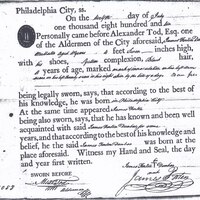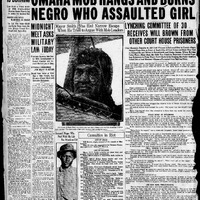 Re: DEI Programs Are Lawful Under Federal Civil Rights Laws and Supreme Court Precedent (2025) Re: DEI Programs Are Lawful Under Federal Civil Rights Laws and Supreme Court Precedent (2025) |
|
This memorandum from law professors across the United States explains how diversity, equity, and inclusion initiatives are legally defensible, in spite of the January 21, 2025, Executive Order titled "Ending Illegal Discrimination and Restoring Merit-Based Opportunity."
|
 Regents of the University of California v. Bakke (1978) Regents of the University of California v. Bakke (1978) |
|
Overturned by the Harvard and UNC v. Students for Fair Admissions decision, the Supreme Court in University of California v. Bakke ruled that college admissions were allowed to take race into account.
|
| Rights of Black Men (1791) |
|
This commentary was written by Connecticut anti-slavery advocate Abraham Bishop in support of the Haitian Revolution. Bishop's work was printed in the Boston newspaper, The Argus.
|
 Ritual on Admission of Indians to Full American Citizenship (1918) Ritual on Admission of Indians to Full American Citizenship (1918) |
|
This set of instructions for conducting the Ritual on Admission of Indians to Full American Citizenship was produced by the Department of the Interior in 1918 so that such ceremonies could take place across the Western reservations. It includes the opening remarks from the Representative of the Department, followed by instructions for each participant to undergo to receive U.S. citizenship. There are separate instructions for men and women. The document reveals the centrality of performance during naturalization events for Native Americans.
|
 Roberto Alvarez, et al. v. E. L. Owen, et al. (1931) Roberto Alvarez, et al. v. E. L. Owen, et al. (1931) |
|
This case was the first successful school desegregation case in the United States, decided fifteen years before Brown v. Board of Education. When the school board in Lemon Grove, California, attempted to build a separate school for students of Mexican origin, the court ruled that the segregation violated state laws which considered people of Mexican descent to be white.
|
 Savanna's Act (2018) Savanna's Act (2018) |
|
Savanna's Act (also known as the Missing and Murdered Indigenous Women Act) addressed federal and tribal jurisdictional cooperation concerning issues of violence and disappearance in the Native American community. The law is named after Savanna LaFontaine-Greywind, a member of the Spirit Lake Nation of North Dakota who was murdered in 2017. The act was signed into law in 2020.
|
 Scott Act (1888) Scott Act (1888) |
|
The Scott Act rejected the guarantee of free travel for Chinese people provided by the Angell Treaty of 1880. The act stated that Chinese laborers who left the U.S. would not be able to return.
|
 Seamen's Protection Certificate for James Forten Dunbar (1810) Seamen's Protection Certificate for James Forten Dunbar (1810) |
|
Seamen's Protection Certificates were documents authorized by an act of Congress in 1796 to protect U.S. sailors from being impressed into the service of foreign navies. For Black Americans, they also served as a way to document their free status. This certificate was issued for James Forten Dunbar, a free man of mixed ancestry who spent a long career at sea as a sailor and sail-maker aboard merchant and naval vessels, including service in the U.S. Navy during the Civil War.
|
 Selective Service Act (1917) Selective Service Act (1917) |
|
This act authorized the U.S. government to raise a national army through compulsory enlistment via a draft. The military was segregated at the time of World War I, and Black soldiers were mostly relegated to labor roles.
|
 Selective Training and Service Act (1940) Selective Training and Service Act (1940) |
|
This act authorized the U.S. government to raise a national army through compulsory enlistment via a draft. While the act prohibited discrimination based on race, the military was still segregated at the time of World War II, and Black soldiers were mostly relegated to labor roles.
|
 Smith v. Directors of Independent School Dist. of Keokuk (1875) Smith v. Directors of Independent School Dist. of Keokuk (1875) |
|
In this case, the Iowa Supreme Court affirmed a lower court's ruling that the Keokuk school district could not refuse to admit a Black student based on race. Legal precedent for this case as set in the 1868 ruling in Clark v. Board of School Directors.
|
 State of Iowa v. Katz (1949) State of Iowa v. Katz (1949) |
|
In this case, the Iowa Supreme Court upheld a lower court's jury verdict that Katz Drug Store violated the civil rights of three Black patrons when workers refused to serve them at the store's soda fountain.
|
 State of Missouri v. Celia (1855) State of Missouri v. Celia (1855) |
|
In this case, eighteen-year-old Celia was convicted of murdering her enslaver. The case considered whether Celia was guilty of murder or if she could be acquitted due to self-defense from sexual assault. The court ruled that Celia's enslaved status prevented her from being eligible to protect herself, and she was sentenced to death.
|
 Students for Fair Admission v. Harvard (2023) Students for Fair Admission v. Harvard (2023) |
|
This Supreme Court case considered whether Harvard's admissions process violated Title VI of the Civil Rights Act. The Court decided that the race-based admissions system did not meet the strict scrutiny required to allow a race-based system, and held as unconstitutional the consideration of an applicant’s race as a factor in making an admissions decision that benefits diversity.
|
 Studying the Missing and Murdered Indian Crisis Act of 2019 Studying the Missing and Murdered Indian Crisis Act of 2019 |
|
This bill was introduced to authorize the Government Accountability Office to collect data and study the crisis of missing and murdered Native Americans. It did not pass into law, but was a part of a broader legislative effort to bring awareness to murdered and missing Indigenous People.
|
 Terry v. Ohio (1968) Terry v. Ohio (1968) |
|
Terry v. Ohio is the landmark Supreme Court case that established the basis for stop and frisk policies. These policies disproportionately affect Black people and lead to the disproportionate incarceration of Black Americans.
|
 Terry v. Ohio (1968) Terry v. Ohio (1968) |
|
Terry v. Ohio is the landmark Supreme Court case that established the basis for stop and frisk policies. These policies disproportionately affect Black people and lead to the disproportionate incarceration of Black Americans.
|
 The Insular Cases and Contested Citizenship The Insular Cases and Contested Citizenship |
|
This teaching module discusses the intersection of U.S. colonial power and migration, featuring a webinar with Robert McGreevey, author of the 2018 book, Borderline Citizens: The United States, Puerto Rico, and the Politics of Colonial Migration.
|
 The Letters of Amerigo Vespucci, the First Voyage (1503) The Letters of Amerigo Vespucci, the First Voyage (1503) |
|
The account of Amerigo Vespucci's first voyage to the Americas features depictions of Indigenous people that created negative stereotypes.
|
 The Lynching of Will Brown (1919) The Lynching of Will Brown (1919) |
|
The day after the lynching of Will Brown, the Omaha Bee devoted the first two pages of its edition to the racial terror violence enacted by a mob of white Omahans. The articles on these pages provide different perspective of the race riot, from the crowds cheering at the destruction of government buildings, to the alleged assault victim's shock at the incident. The newspaper also featured a list of victims of the mob.
|
 The Woman Suffrage Movement and Frederick Douglass (1908) The Woman Suffrage Movement and Frederick Douglass (1908) |
|
In this speech given on the 60th Anniversary of the Seneca Falls Convention, Black women's rights advocate Mary Church Terrell reflects on the role of Frederick Douglass in the women's suffrage movement.
|
 Trump v. Hawaii (2018) Trump v. Hawaii (2018) |
|
In this case, the Supreme Court ruled that the travel ban instituted by President Trump's Executive Order 13780 was within presidential power granted by Section 212(f) of the Immigration and Nationality Act of 1965.
|
 United States v. Brignoni-Ponce (1975) United States v. Brignoni-Ponce (1975) |
|
In this case, the Supreme Court ruled that it was a violation of the Fourth Amendment for law enforcement to stop a vehicle solely on the basis of the driver appearing to be of Mexican descent. Appearance of ethnicity did not constitute reasonable suspicion for the stopping and interrogation of a vehicle and its passengers.
|
| United States v. Cartozian (1925) |
|
In this case, the District Court of Oregon debated whether an Armenian immigrant was white enough to be naturalized. Just two years after the Supreme Court ruled that Ozawa, a Japanese man, and Thind, a South Asian man, were not white enough for naturalization, the Oregon court ruled that people from Asia Minor were close enough to European descent to be naturalized.
|
 United States v. Joseph (1876) United States v. Joseph (1876) |
|
In this case, the Supreme Court ruled that the Pueblo people were not Indians within the meaning of the Indian Nonintercourse Act in part because they had received full legal title to their land from the Spanish.
|
 Re: DEI Programs Are Lawful Under Federal Civil Rights Laws and Supreme Court Precedent (2025)
Re: DEI Programs Are Lawful Under Federal Civil Rights Laws and Supreme Court Precedent (2025) Regents of the University of California v. Bakke (1978)
Regents of the University of California v. Bakke (1978) Ritual on Admission of Indians to Full American Citizenship (1918)
Ritual on Admission of Indians to Full American Citizenship (1918) Roberto Alvarez, et al. v. E. L. Owen, et al. (1931)
Roberto Alvarez, et al. v. E. L. Owen, et al. (1931) Savanna's Act (2018)
Savanna's Act (2018) Scott Act (1888)
Scott Act (1888) Seamen's Protection Certificate for James Forten Dunbar (1810)
Seamen's Protection Certificate for James Forten Dunbar (1810) Selective Service Act (1917)
Selective Service Act (1917) Selective Training and Service Act (1940)
Selective Training and Service Act (1940) Smith v. Directors of Independent School Dist. of Keokuk (1875)
Smith v. Directors of Independent School Dist. of Keokuk (1875) State of Iowa v. Katz (1949)
State of Iowa v. Katz (1949) State of Missouri v. Celia (1855)
State of Missouri v. Celia (1855) Students for Fair Admission v. Harvard (2023)
Students for Fair Admission v. Harvard (2023) Studying the Missing and Murdered Indian Crisis Act of 2019
Studying the Missing and Murdered Indian Crisis Act of 2019 Terry v. Ohio (1968)
Terry v. Ohio (1968) Terry v. Ohio (1968)
Terry v. Ohio (1968) The Insular Cases and Contested Citizenship
The Insular Cases and Contested Citizenship The Letters of Amerigo Vespucci, the First Voyage (1503)
The Letters of Amerigo Vespucci, the First Voyage (1503) The Lynching of Will Brown (1919)
The Lynching of Will Brown (1919) The Woman Suffrage Movement and Frederick Douglass (1908)
The Woman Suffrage Movement and Frederick Douglass (1908) Trump v. Hawaii (2018)
Trump v. Hawaii (2018) United States v. Brignoni-Ponce (1975)
United States v. Brignoni-Ponce (1975) United States v. Joseph (1876)
United States v. Joseph (1876)